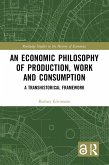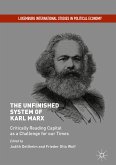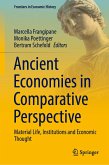This book provides a concise history of economic thought for readers of all ages. While some basic economics knowledge would be helpful, it is not required. The book sets out to achieve three aims: to be interesting, entertaining, and thought-provoking. While the authors may appear opinionated in certain instances, this is intentionally done in order to alert readers to form their own views. History of ideas does not make the us smarter nor richer, but it can reduce our ignorance and the "banality of evil"-a term Hannah Arendt referred to people who lack self-reflection, "He did his duty...; he not only obeyed orders, he also obeyed the law."
Dieser Download kann aus rechtlichen Gründen nur mit Rechnungsadresse in A, B, BG, CY, CZ, D, DK, EW, E, FIN, F, GR, HR, H, IRL, I, LT, L, LR, M, NL, PL, P, R, S, SLO, SK ausgeliefert werden.









